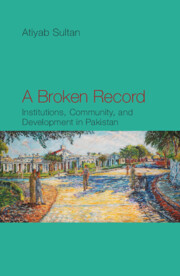Book contents
- Frontmatter
- Contents
- List of Figures
- List of Tables
- Preface
- Acknowledgements
- Introduction: Institutions, Debt, and the Deadweight of History, Punjab c. 1900–47
- 1 Glass Half Full?: Two Views of the Punjab
- 2 An Alternative Economic History of the Punjab
- 3 Combating Indebtedness I: Laws and Institutions
- 4 Combating Indebtedness II: Community Development in Colonial Punjab
- 5 The Bureaucrat’s Burden: Tales of Reform and Development
- 6 Colonialism and the Discourse on Development
- Postscript
- Glossary
- Bibliography
- Index
6 - Colonialism and the Discourse on Development
Published online by Cambridge University Press: 27 September 2022
- Frontmatter
- Contents
- List of Figures
- List of Tables
- Preface
- Acknowledgements
- Introduction: Institutions, Debt, and the Deadweight of History, Punjab c. 1900–47
- 1 Glass Half Full?: Two Views of the Punjab
- 2 An Alternative Economic History of the Punjab
- 3 Combating Indebtedness I: Laws and Institutions
- 4 Combating Indebtedness II: Community Development in Colonial Punjab
- 5 The Bureaucrat’s Burden: Tales of Reform and Development
- 6 Colonialism and the Discourse on Development
- Postscript
- Glossary
- Bibliography
- Index
Summary
All knowledge that is about human society, and not about the natural world, is historical knowledge, and therefore rests upon judgment and interpretation. This is not to say that facts or data are nonexistent, but that facts get their importance from what is made of them in interpretation … for interpretations depend very much on who the interpreter is, who he or she is addressing, what his or her purpose is, at what historical moment the interpretation takes place.
—Edward W. Said, Covering IslamThe Indian Government being minded to discover the economic condition of their lands, sent a Committee to inquire into it; and saw that it was good…
Now this is the position
Go make an inquisition
Into their real condition
As swiftly as ye may.
Ay, paint our swarthy billions
The richest of vermilions
—Rudyard Kipling, The Masque of PlentyCooperation, legislation, and the drive towards rural reconstruction in the Punjab comprised the immediate response to the problem of rural indebtedness in the province. From the Alienation of Land Act and the cooperative credit societies, a much wider push towards ‘rural reconstruction’ emerged, which encapsulated various ideas of reform as discussed in Chapter 3. Another development was the beginning of a discourse on rural affairs that was centred on statistical inquiry and intensive data gathering in the province. This culture of knowledge starting in the 1920s was significant for several reasons:
firstly, it emerged in a political climate where the government needed to show greater knowledge of its rural subjects after the Montagu–Chelmsford reforms. The research agenda and scope of the studies were also defined and limited by political considerations. Second, it signalled a global move towards statistical inquiry in agricultural life with similar questions being studied elsewhere. Such inquiries were the precursor to two fields of study that became more developed by the 1950s and 1960s: peasant studies and development studies. Third, the inquiries did not challenge the official narrative on various socio-economic issues and instead confirmed many existing colonial biases. And finally, in keeping with an argument made elsewhere in the book, the inquiries reaffirm the limited memory of development studies, in that they remain largely forgotten and unused. This chapter develops these points by discussing the emergence of this new culture of research during the interwar period.
- Type
- Chapter
- Information
- A Broken RecordInstitutions, Community and Development in Pakistan, pp. 158 - 191Publisher: Cambridge University PressPrint publication year: 2022



